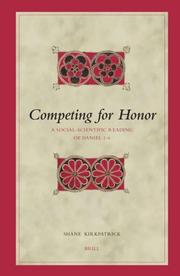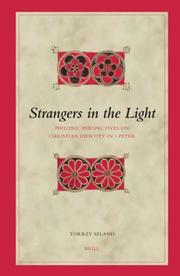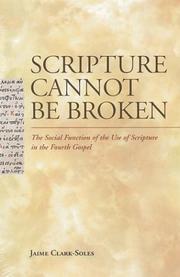| Listing 1 - 4 of 4 |
Sort by
|

ISBN: 1280868414 9786610868414 1429453559 9047407911 1433707764 9781429453554 9789004144873 9004144870 9781433707766 9004144870 9781280868412 6610868417 9789047407911 Year: 2005 Publisher: Leiden Brill
Abstract | Keywords | Export | Availability | Bookmark
 Loading...
Loading...Choose an application
- Reference Manager
- EndNote
- RefWorks (Direct export to RefWorks)
Using social-scientific criticism, this work presents a reading of Daniel 1-6 as literature of resistance. The characters and episodes of these tales are read against a backdrop of social competition for the cultural value of honor. Each of the tales of Daniel 1-6 is analyzed, revealing a comparison that is sustained throughout the compilation and that pits the Judean tradition in competition with a dominant foreign tradition. The dynamics of comparison and competition are explored in each tale with the help of social-scientific models depicting honor and exploring the related dynamics of purity, patronage, virtue, limited good, and envy. This work is particularly useful for scholars and students interested in social-scientific criticism and the value of that methodology for Hebrew Bible study, as well as for those interested in Daniel, honor and shame, ancient rhetoric, and cultural resistance in the postexilic period.
Bible. --- Social scientific criticism. --- 224.5 --- Daniël --- Daniel (Book of the Bible) --- Social scientific criticism of sacred works.

ISBN: 9004144919 9786610868438 1429453567 9047407938 1280868430 1433704293 9781429453561 9789004144910 9781433704291 Year: 2005 Volume: 76 Publisher: Leiden Brill
Abstract | Keywords | Export | Availability | Bookmark
 Loading...
Loading...Choose an application
- Reference Manager
- EndNote
- RefWorks (Direct export to RefWorks)
The author of the present work wants to throw new light on the intended readers of 1 Peter by investigating what it could possibly mean that they were to live as Strangers in the Light. It is argued that the author of 1 Peter considers his readers as living a life influenced by social circumstances very much comparable to those of the Diaspora proselytes to Judaism. Hence similar discussions in Jewish Diaspora works can illuminate his descriptions and exhortations. Among these Diaspora works, the works of Philo of Alexandria should be drawn into the discussions in a much more comprehensive way than has been done so far. In addition to a study of the role of Silvanus in the making of the letter, this volume contains four studies that carry out what the author calls 'philonic readings' of central issues of 1 Peter 2,5-11. The study will demonstrate the usefulness of Jewish diaspora works for understanding the social life of the early Christians.
Etrangers dans la Bible --- Strangers in the Bible --- Vreemdelingen in de Bijbel --- 227*22 --- 227*22 Brieven van Petrus --- Brieven van Petrus --- Strangers in the Bible. --- Philo, --- Bible. --- Social scientific criticism. --- Alexandria, --- Filon --- Filón, --- Filon, --- Filone, --- Philon, --- Philonis, --- Yedidyah, --- פילון --- פילון מאלכסנדריה --- פילון, --- פילון היהודי --- Филон Александрийский --- Filon Aleksandriĭskiĭ --- Pseudo-Philo --- Epistle of Peter, 1st --- Peter, 1st (Book of the New Testament) --- Peter (Book 1) --- Bible. N.T. Peter I --- Social scientific criticism --- Philo of Alexandria --- Social scientific criticism of sacred works.

ISBN: 1280463856 9786610463855 142371444X 9047403347 9781423714446 9789047403340 9780391041417 039104141X 9781280463853 039104141X Year: 2003 Publisher: Boston Brill Academic Publishers
Abstract | Keywords | Export | Availability | Bookmark
 Loading...
Loading...Choose an application
- Reference Manager
- EndNote
- RefWorks (Direct export to RefWorks)
Scripture is powerful for all who lend it authority. Clark-Soles explores the ways in which the author of the Fourth Gospel deploys scripture to form his sectarian community. The first part of the book provides the sociological framework for addressing the role of scripture within sectarian communities. By definition, sects are in conflict with a parent tradition. How, if at all, does a sect appropriate those texts that not only "belong" to the parent tradition but also are used by that parent tradition to deride the sectarians? By investigating the dynamics of scripture in the ancient Qumran community and in the modern Branch Davidian community, Clark-Soles sheds light on the community of the Fourth Gospel.
Johannine school. --- Qumran community. --- Kumran community --- Jewish sects --- Essenes --- Circle, Johannine --- Community, Johannine --- Johannine circle --- Johannine community --- School, Johannine --- School of John (Biblical criticism) --- Branch Davidians. --- Bible. --- Bible --- Jean (Book of the New Testament) --- Johanisi (Book of the New Testament) --- Johannesevangelium --- John (Book of the New Testament) --- Yohan pogŭm --- Yohane den (Book of the New Testament) --- Yūḥannā (Book of the New Testament) --- Social scientific criticism. --- Use --- History. --- Johannine school --- Qumran community --- 226.5 --- Evangelie volgens Johannes --- Biblia --- Ioganaĭ (Book of the New Testament) --- Иоганай (Book of the New Testament) --- Social scientific criticism of sacred works.
Book
ISBN: 9781575064376 1575064375 9781575064383 1575064383 Year: 2016 Publisher: Winona Lake, Indiana Eisenbrauns
Abstract | Keywords | Export | Availability | Bookmark
 Loading...
Loading...Choose an application
- Reference Manager
- EndNote
- RefWorks (Direct export to RefWorks)
In this study, Wu explores how the concepts honor, shame, and guilt function in the book of Ezekiel, as well as in the wider contexts of their general use in anthropological or social-scientific approaches to biblical studies. He frames Ezekiel's key terms for honor (kabod), shame (bosh), and guilt ('awah) within an analysis of a broad perspective on these terms in the body of the Old Testament as a way of forming the "concept spheres" within which the specific instances of each term in Ezekiel sit. Wu gleans insight from the dominant contemporary definitions of honor, shame, and guilt in the fields of psychology and anthropology and their application to biblical studies, and he reflects on how this broader context informs and is informed by his analysis of Ezekiel. The study concludes by drawing together the implications and contribution of the analysis of Ezekiel and applying them to the development of social-scientific models for the future.
224.4
---
224.4 Ezechiel
---
224.4 Ezechiël
---
Ezechiel
---
Ezechiël
---
Bible.
---
Esŭgel (Book of the Old Testament)
---
Ezechiel (Book of the Old Testament)
---
Ezekiel (Book of the Old Testament)
---
Ezekieli (Book of the Old Testament)
---
Hesekiel (Book of the Old Testament)
---
Yechezkel (Book of the Old Testament)
---
Yeḥezḳel (Book of the Old Testament)
---
Social scientific criticism.
---
Guilt
---
Shame
---
Honor
---
Sozialgeschichtliche Exegese
---
Anthropologie
---
Social scientific criticism of sacred works.
---
Emotions
---
Ethics
---
Conscience
---
Honour
---
Chivalry
---
Conduct of life
---
Biblical teaching.
---
Psychological aspects
---
Bibel
---
Buch Hesekiel
---
Hesekiel
---
Ez
---
Ezek
---
Ezekiel (Buch der Bibel)
---
<
| Listing 1 - 4 of 4 |
Sort by
|

 Search
Search Feedback
Feedback About UniCat
About UniCat  Help
Help News
News